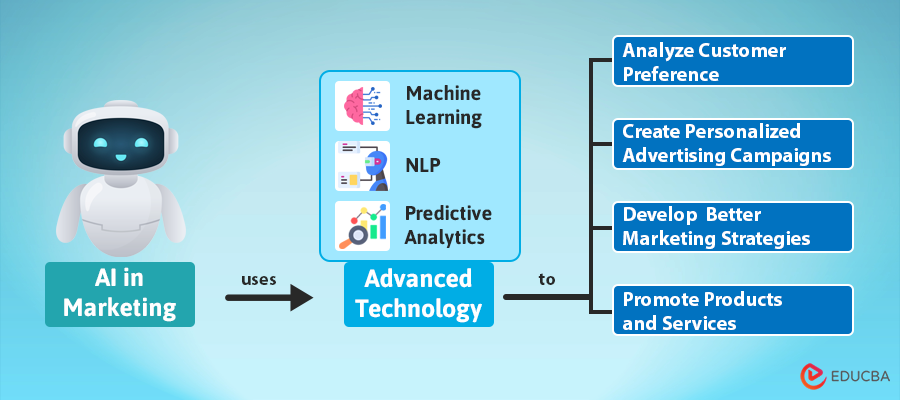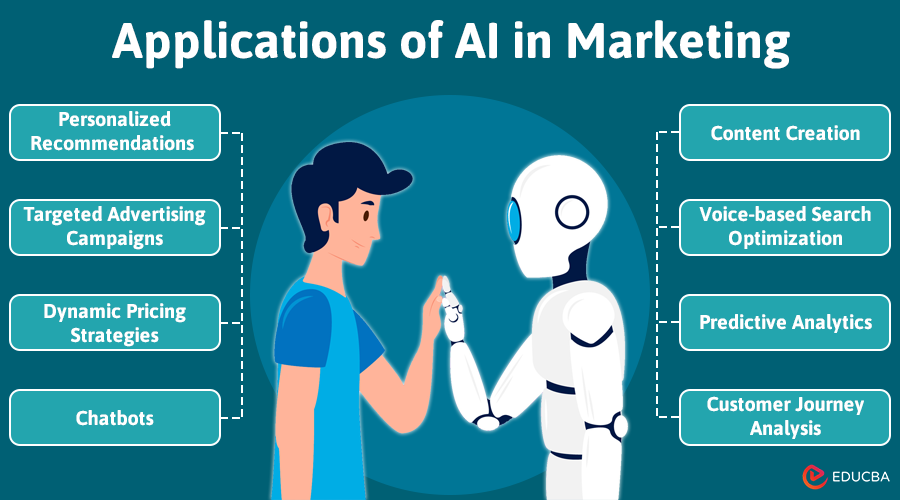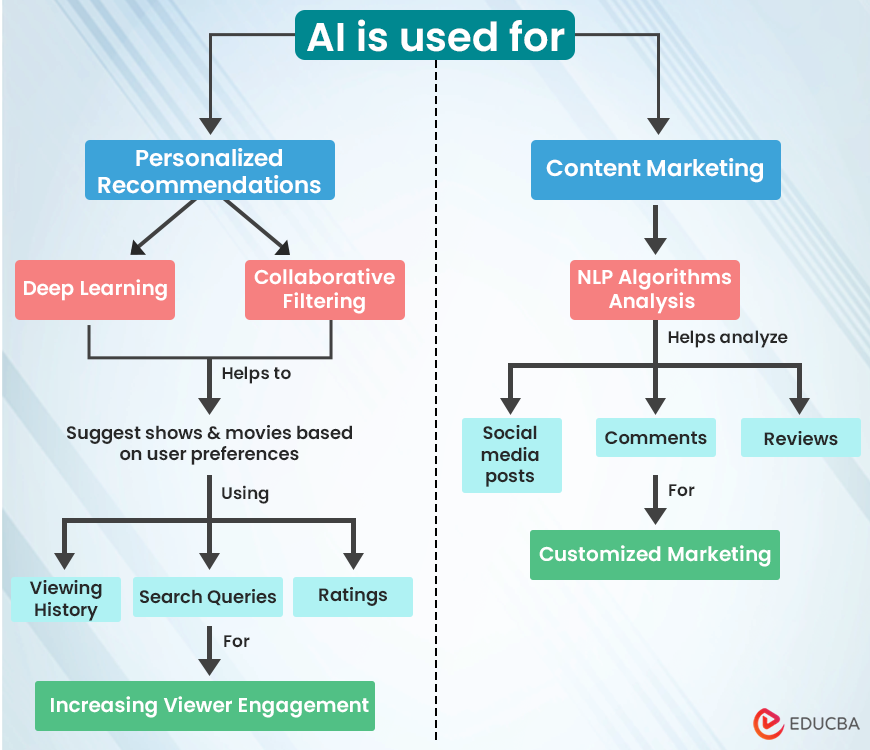What is AI in Marketing?
Imagine a world where algorithms determine how businesses can sell products/services and predict what people will buy. It is not just something from a futuristic movie; it’s the present reality of AI in marketing.
AI in marketing is when businesses use advanced technologies (machine learning, NLP, and predictive analytics) to understand what customers prefer to buy, create distinct advertising campaigns to attract them, and develop better marketing strategies to promote products and services.
The first time researchers used AI in marketing was during the 1950s and 1960s. They were trying to optimize marketing mix and pricing strategies using techniques like linear programming, game theory, and decision trees.
Researchers think that by 2028, the AI marketing industry will be worth an incredible $107.5 billion. In fact, about 68% of marketers are already using AI in their everyday work, showing that AI is changing how marketing works.
So, let’s explore AI marketing and the benefits and challenges it presents for businesses and consumers.
Table of Contents
Past and the Present of AI in Marketing
Initially, AI in marketing focused on simple tasks such as personalized email marketing (customized emails for individual recipients) and recommendation systems (suggesting products).
Now, it can handle complex marketing strategies such as predictive analytics (forecasting future trends) and dynamic pricing (real-time price adjustments based on demand and competition).
Current trends in AI marketing include:
- AI-Powered Advertising
- Voice Search Optimization
- Chatbots
- Content Generation
- Personalized Customer Experiences and more.
Applications
Given below are some examples of applications of AI in marketing:
1. Personalized Recommendations
Suppose a makeup brand uses AI to suggest products based on customers’ purchases and website activity. If a customer frequently buys lipstick, the AI could recommend new lipstick colors, lip liners, or lip glosses.
2. Targeted Advertising Campaigns
Consider a streaming platform that uses AI to monitor users’ viewing habits. The AI finds a group of viewers who love sci-fi content. It then creates targeted ads for new sci-fi shows and related products, displaying these ads on various digital platforms. It leads to more user interactions and increased subscriptions.
3. Dynamic Pricing Strategies
Consider an airline that uses AI to adjust ticket prices based on demand. During busy travel times, such as holidays, prices increase, while they decrease during quieter periods to attract more customers.
4. Chatbots
Consider a bank that adds a chatbot to its website to handle common queries such as “What is my account balance?” and “How can I reset my password?” It reduces the strain on human staff and improves overall customer service.
5. Content Creation
Imagine a company using AI to generate social media posts or to create descriptions for its new organic food products. The AI reviews past descriptions and customer feedback to produce compelling and relevant content.
6. Voice-based Search Optimization
Picture a travel agency that introduces voice search on its website. When users ask about the best vacation spots in Asia, the company’s website immediately shows results for the top destinations in Asia.
7. Predictive Analytics
Imagine an online gifting website that uses predictive analytics to suggest the perfect gifts for customers. The website can recommend gifts that match the recipient’s preferences by analyzing user browsing history, purchase patterns, and popular gifts.
8. Customer Journey Analysis
Imagine a software company that tracks the customer journey from trial to purchase. By analyzing this journey, they can improve the onboarding process and make the user experience smoother.
Benefits
Here are some of the major benefits of AI in marketing:
1. Greater Efficiency
As AI automates repetitive marketing tasks, it can free up time for the members of the sales or marketing department. This increased efficiency leads to higher productivity.
Example:
2. Accuracy
Using AI, marketers can improve the precision of targeting and personalization. It means AI can help marketers create more relevant ads for individual users. And more relevant ads can increase conversion chances, which means better return on investment (ROI)
Example:
3. Cost Reduction
When you compare the traditional way of doing things with AI-driven methods, you will see that AI can substantially save costs. It is because AI performs tasks that used to require a lot of human effort more quickly and efficiently.
Example:
4. Enhanced Customer Experience
Businesses can improve customer experience through personalized and timely interactions enabled by AI. Surveys show that customers are more satisfied with AI-enhanced services, leading to increased loyalty and retention.
Example:
Challenges
- When using AI, businesses must tackle key challenges related to data privacy. They must follow data protection laws and establish strong security measures to protect customer data.
- Marketers should know that AI algorithms can be biased, especially if trained on unrepresentative data. It’s important to constantly check for and correct any biases to ensure fair results.
- The initial cost of AI tools can be high, which can be tough for small businesses. However, the long-term benefits often make the upfront costs worth it.
- As businesses start using AI systems, they need more skilled workers to manage and improve these technologies. Investing in training and development is essential to fully benefit from AI.
Real-World Example: Netflix
Netflix uses AI to improve its marketing strategies. The company aims to give users a more personalized experience and increase engagement and retention by using AI in personalized recommendations and content marketing.
- For personalized recommendations, Netflix uses algorithms like collaborative filtering and deep learning to suggest shows and movies based on user preferences. It analyzes viewing history, search queries, and ratings to increase viewer engagement and retention.
- In content marketing, Netflix uses NLP algorithms to analyze social media posts, user comments, and reviews. It allows the company to tailor marketing messages more effectively.
Future of AI in Marketing
The market value of AI in marketing is projected to grow from $27.37 billion in 2023 to $39.99 billion by the end of 2024. It shows a promising future for AI in marketing. We can expect several advancements, such as:
- Advanced natural language processing
- Enhanced predictive analytics
- AI-powered virtual reality experiences
- Improved customer interaction tools
These advancements will help marketers engage better with their audience.
Final Thoughts
Businesses that use AI-driven marketing will be in a strong position to succeed in a competitive market. AI is changing marketing by giving better insights and making processes more efficient. Although there are challenges like data privacy and implementation costs, the benefits are much greater.
Recommended Articles
If this comprehensive article on AI in marketing helped you learn more about AI and marketing from these articles.








